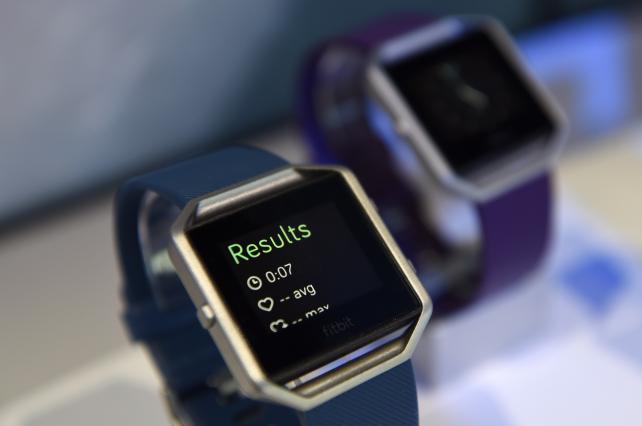
A Fitbit Blaze fitness tracker is displayed during the 2016 Consumer Electronics Show in Las Vegas. Credit: David Paul Morris/Bloomberg
Ads have already come to the so-called Internet of Things, an Interactive Advertising Bureau report has found.
The trade organization surveyed consumers about “IoT” devices, things connected to the web ranging from fitness wearables to cars, and found that 62% of people who own any have already seen an ad on one.
The IAB’s Internet of Things study, conducted in conjunction with research firm MARU VCR&C, also found that a significant portion of consumers, particularly ones who own devices like health trackers, smart TVs or web-connected eyeglasses, are comfortable with ads popping up in them. Of the 1,200 consumers surveyed, 55% said they’d be willing to receive ads targeted in IoT devices in exchange for goodies like discounts or exclusive games.
What’s more, of the consumers who already own connected devices, 65% would approve of ads in those environments in exchange for such incentives. The IAB report also drew attention to the marketer-friendly demographic characteristics of willing IoT ad recipients, 69% of whom earn $100,000 or more and 68% of whom are aged 18 to 34.
The concept of advertising in the emerging IoT realm should not surprise anyone, and while today’s messages may be the equivalent of “house ads” in which, say, an IoT product maker promotes its own offerings, their existence portends a future in which third parties get in on the action. That will mean that data tracking, collection and sharing will extend beyond our computers and phones to the wristwatches measuring our footsteps, the refrigerators monitoring our soy milk supply, the food packages that know how long they’ve been in our pantries, and vehicles that track our driving behavior.
Not only does that add to data security concerns, it compounds data privacy fears.
“The marketing and advertising techniques emerging in the health and wearables arena call for an ethical and policy agenda that will ensure fair practices,” said a new report from American University and The Center for Digital Democracy, a veteran privacy advocacy group that has become known as a dogged critic of consumer data use by advertisers. The report, “Health Wearable Devices in the Big Data Era: Ensuring Privacy, Security, and Consumer Protection,” calls on industry and regulators to ensure safeguards “so that personal health information is not used for marketing purposes that are unfair, deceptive, manipulative, or discriminatory.”
While the report focuses on fitness trackers and the health and medical data they generate, its calls for better privacy by design can be applied to other IoT areas.
“Today’s digital practices have outpaced federal safeguards, calling for much more proactive research on contemporary market trends and closer scrutiny of emerging practices,” the report said.
Experimentation in IoT third-party data sharing has already begun. IoT platform company Evrythng partnered with digital ad firm Trueffect in 2015 to work towards devising ways marketers can use information gathered when consumers use their products. The firms hoped to directly communicate with those consumers and eventually target ad messages to them.
Companies gathering IoT data might also do so to better understand who bought their products and how they are used or consumed, allowing them to add new data points to CRM databases, inform future product development, generate points for a loyalty program and conduct marketing efforts with messages specific to that use.
The report from the American University and The Center for Digital Democracy called on IoT device makers and regulators to update their standard approaches to data privacy by limiting data collection and use, and provided relevant transparency and notifications to consumers that aren’t buried in privacy policies or “opt-in” legalese.
Sources: adage.com


